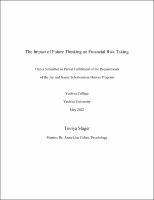Please use this identifier to cite or link to this item:
https://hdl.handle.net/20.500.12202/8203Full metadata record
| DC Field | Value | Language |
|---|---|---|
| dc.contributor.advisor | Cohen, Anna-Lisa | - |
| dc.contributor.author | Slager, Toviya | - |
| dc.date.accessioned | 2022-05-23T16:07:30Z | - |
| dc.date.available | 2022-05-23T16:07:30Z | - |
| dc.date.issued | 2022-05 | - |
| dc.identifier.citation | Slager, T. (2022, May). The Impact of Future Thinking on Financial Risk Taking. Undergraduate honors thesis, Yeshiva University. | en_US |
| dc.identifier.uri | https://hdl.handle.net/20.500.12202/8203 | - |
| dc.description | Undergraduate honors thesis, YC / Open Access | en_US |
| dc.description.abstract | Financial risk is involved in many of the decisions that we make daily. These decisions may be influenced by our previous memories and experiences that involved financial risk (Graham, Megginson, & Smart, 2010). Our ability to project ourselves into an imagined future event is known as episodic future thinking (EFT; Schacter, Benoit, & Szpunar, 2017). In this experiment, we examined how imagining a positive or negative future financial decision can influence a subsequent task that measures financial risk taking. Seventy-nine participants from Yeshiva University were randomly assigned to one of three conditions. Participants were asked to imagine a positive financial decision (positive condition), a negative financial decision (negative condition), or to experience a neutral event (control condition). All groups were then asked to complete the Balloon Analogue Risk Task (BART) which has been shown to measure an individual’s level of financial risk taking (Lejuez et. al, 2002). We predicted that engaging in both positive and negative self-projection would significantly influence the levels of risk taking with those in the positive condition showing significantly higher levels of risk taking relative to the negative and control conditions and those in the negative condition showing the lowest levels of risk taking. Results yielded a lack of statistically significant changes in level of risk taking based on condition. Explanations for this absence of effects are discussed. | en_US |
| dc.description.sponsorship | The Jay and Jeanie Schottenstein Honors Program | en_US |
| dc.language.iso | en_US | en_US |
| dc.publisher | Yeshiva College, Yeshiva University | en_US |
| dc.relation.ispartofseries | The Jay and Jeanie Schottenstein Honors Theses;May 2022 | - |
| dc.rights | Attribution-NonCommercial-NoDerivs 3.0 United States | * |
| dc.rights.uri | http://creativecommons.org/licenses/by-nc-nd/3.0/us/ | * |
| dc.subject | Balloon Analogue Risk Task (BART) | en_US |
| dc.subject | risk taking | en_US |
| dc.subject | episodic future thinking (EFT) | en_US |
| dc.title | The Impact of Future Thinking on Financial Risk Taking | en_US |
| dc.type | Thesis | en_US |
| Appears in Collections: | Jay and Jeanie Schottenstein Honors Student Theses | |
Files in This Item:
| File | Description | Size | Format | |
|---|---|---|---|---|
| Slager May2022 OA FINAL PAPER.V4 approved by alc.pdf | 253.31 kB | Adobe PDF |  View/Open |
This item is licensed under a Creative Commons License

